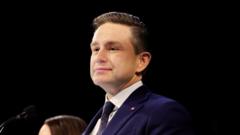In a dramatic turn of events, the Conservative Party of Canada, led by Pierre Poilievre, suffered a shocking loss in the recent elections, despite leading opinion polls by 27 points just weeks before casting ballots. The party's disappointing performance, which marked its fourth consecutive election defeat, has ignited a flurry of blame and introspection within its ranks as Poilievre faces the prospect of rebuilding support among party members and the electorate.
On election night, as the Liberal victory became evident, conservative supporters were left bewildered. Despite securing almost 42% of the popular vote—the highest since the party's inception in 2003—the loss of Poilievre’s long-held seat has raised critical questions about his position as leader. “Nobody's happy about that,” commented Shakir Chambers, a Conservative strategist. In response, discussions about the party's next steps are set to take place during an upcoming caucus meeting.
In a bid to regain his footing, Poilievre announced his intention to run in a special election for a seat in Alberta, following the resignation of Conservative MP-elect Damien Kurek. Kurek asserted that Poilievre’s leadership has fostered an “unstoppable movement” and expressed optimism about his return to the House of Commons. Alberta, being a Conservative stronghold, is seen as a favorable ground for Poilievre.
However, questions linger about whether the party still supports Poilievre as their leader. Chambers believes that sentiment remains largely in favor of Poilievre, as many party members are keen on allowing him the chance to continue. Yet, some members have begun pointing fingers, most notably at Ontario Premier Doug Ford, who they believe undermined the federal party’s campaign through his disengagement.
Jamil Jivani, who won his seat in a Toronto suburb, explicitly criticized Ford for his “get-tough” tactics and failure to present a unified front. Despite these concerns, Ford’s campaign manager asserted that Poilievre's leadership style, which appeals to western Conservatives, may have alienated potential support in the east. The mixed reception to his populist rhetoric, reminiscent of Trump’s approach, has also been flagged as a stumbling block by observers.
Reflecting on the party's trajectory, Nova Scotia Premier Tim Houston urged for a period of soul-searching and highlighted the need to broaden the appeal of the Conservative Party to avoid further isolation from electorate demographics. With challenges ahead, Poilievre's recovery strategy hinges on reconnecting with party bases while also addressing significant rifts that have emerged in recent months. As leaders prepare for discussions on future strategies, the path forward for Canada’s Conservatives remains uncertain but critical.




















